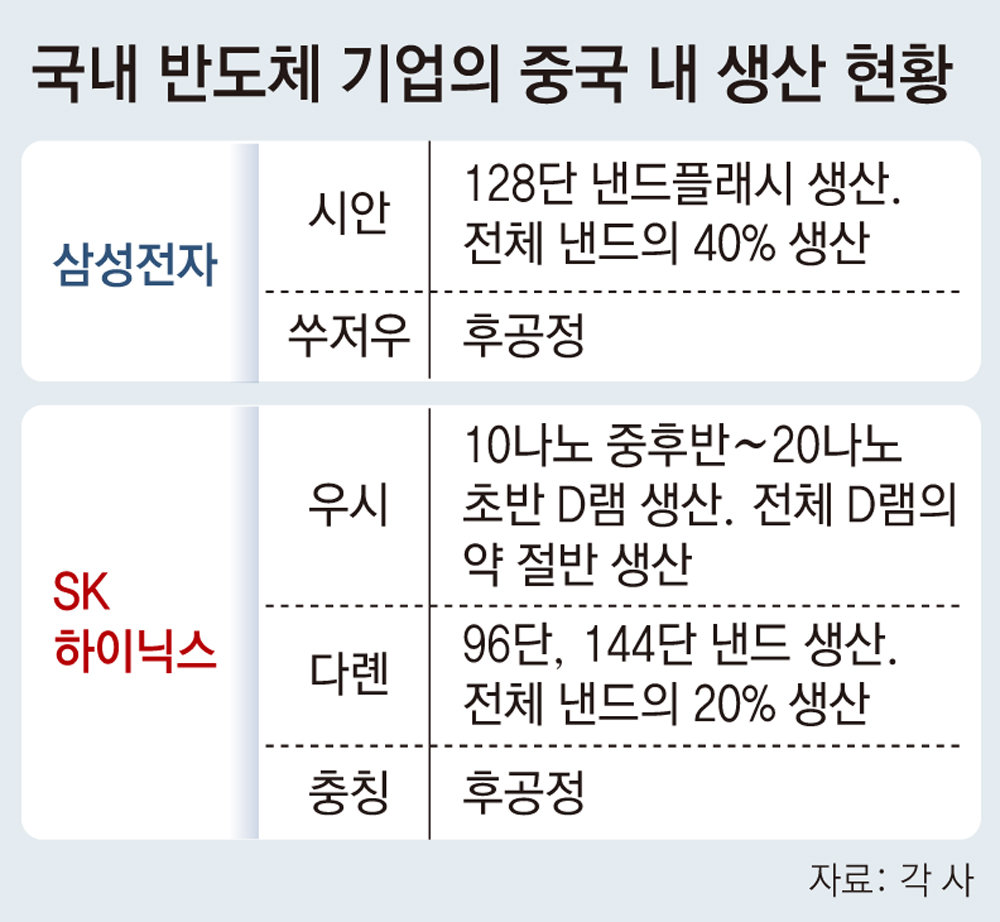When applying the final draft released by the U.S. Department of Commerce
Samsung-SK Chinese production can only ‘maintain the status quo’
Competitiveness is likely to weaken without process improvement.
Equipment export controls also hinder the production of new products
The Korean semiconductor industry’s concerns are deepening after the U.S. government released the final draft of the subsidy guardrail (safety measures) of the ‘CHIPS Act’. There is no problem maintaining the memory semiconductor business currently being produced in China, but without process improvements, the competitiveness of local production facilities will inevitably decline. This is the background to voices calling for guarantees for ‘process upgrades.’
According to the semiconductor industry on the 24th, Samsung Electronics and SK Hynix are closely reviewing the detailed provisions of the subsidy guardrail provisions released by the U.S. Department of Commerce on the 22nd (local time). An official from the semiconductor industry explained, “We will be able to come up with a response plan only after carefully examining specific details such as wafer input and clean room restrictions as well as production capacity limitations.”
China is a production base that plays a key role in the global production strategy of Korean semiconductor companies. Samsung Electronics is producing 128-layer NAND flash (NAND) in Xi’an, China. NAND produced here accounts for 40% of Samsung Electronics’ total NAND production. SK Hynix produces mid to late 10nm to early 20nm DRAM in Wuxi and 96-layer and 144-layer NAND in Dalian. They each account for 50% of SK Hynix’s total DRAM production and 20% of NAND production.
The U.S. government provides subsidies totaling $39 billion (approximately 52 trillion won) to global semiconductor companies investing in the United States through the Semiconductor Act. It states that all subsidies paid will be recovered if the received subsidies are used in regions other than the United States or if countries with security concerns, such as China, expand semiconductor production capacity. This is a regulation that prevents semiconductor companies investing in the United States from producing cutting-edge semiconductors in China.
Specifically, for cutting-edge semiconductors, expansion of production capacity by more than 5% for 10 years from the time the subsidy was received, and for general-purpose semiconductors, expansion of more than 10% was prohibited. The semiconductors that Samsung Electronics and SK Hynix are producing in China are all cutting-edge semiconductors. In fact, only ‘maintaining the status quo’ has become possible.
An official from the Korea Semiconductor Industry Association said, “Restricting the expansion of advanced semiconductor production facilities by 5% is the same as maintaining facilities in China at the current level,” adding, “It is not enough to immediately interfere with existing business, but Samsung and SK’s production in China is “Product competitiveness will decline over time,” he said.
Although technology upgrades are possible in consultation with the U.S. Department of Commerce, U.S. equipment export controls may also pose a challenge as Samsung Electronics and SK Hynix are developing NAND products with 300 layers or more and preparing for mass production next year. Equipment upgrades are required to produce new products at Chinese NAND factories. The U.S. Department of Commerce blocked the export of semiconductor equipment to China in October last year and gave Samsung Electronics and SK Hynix a one-year moratorium. With the grace period ending next month, discussions between the two countries are underway on whether to extend it further. Recently, U.S. Secretary of Commerce Gina Lemondo said that the extension of the moratorium is “under consideration” and that exports of semiconductors for commercial purposes, not for military purposes, will continue.
Source: Donga
Mark Jones is a world traveler and journalist for News Rebeat. With a curious mind and a love of adventure, Mark brings a unique perspective to the latest global events and provides in-depth and thought-provoking coverage of the world at large.
